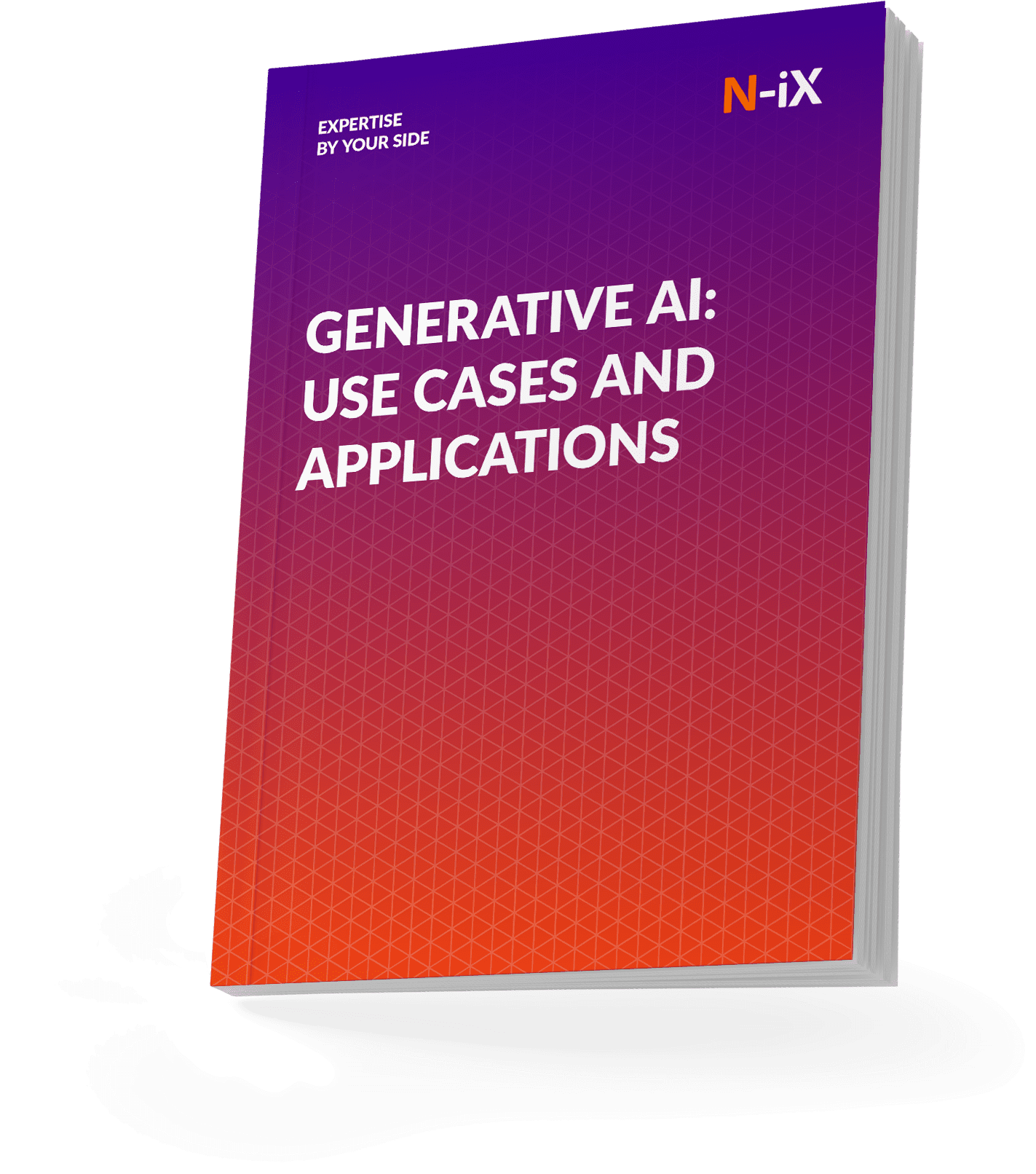Conversational AI is a solution to enhanced patient care and operational efficiency. Utilizing technologies such as Artificial Intelligence, Machine Learning, and Natural Language Processing, it facilitates natural, human-like interactions between users and machines through spoken or written language in chatbots and virtual assistants. AI systems can engage in meaningful conversations, understand queries, and respond intelligently to patients and healthcare providers.
Let's explore conversational AI applications in the healthcare industry and their benefits.
Benefits of implementing conversational AI in healthcare services
The integration of conversational AI for healthcare services offers many positive outcomes for both patients and healthcare providers. Let's explore these advantages in detail.
Benefits for patients:
- Improved access to information: AI systems are available 24/7, providing patients with reliable answers to their healthcare questions and concerns. This continuous availability means that patients no longer need to wait for office hours to get the information they need, whether it's about symptoms, treatment options, or general health advice.
- Enhanced patient engagement: Chatbots can send medication reminders, prompt patients to schedule follow-up appointments, and offer personalized health tips. This proactive approach helps patients keep healthy regimens, reducing the risk of missed medications or appointments.
- Personalized support: AI systems can tailor their guidance based on individual health conditions, medical history, and personal preferences. This level of personalized care guarantees that patients receive relevant and practical advice that fits their unique health needs, which can improve adherence to treatment plans and overall health outcomes.
Benefits for healthcare providers:
- Streamlined workflows: AI-powered systems can automate administrative tasks such as appointment scheduling, prescription refills, and patient follow-ups. This automation reduces the administrative workload on healthcare staff.
- Improved patient outreach: Virtual assistants can deliver preventative care reminders, follow-up messages, and health tips directly. This proactive communication helps patients adhere to their care plans and engage in preventive health behaviors.
- Enhanced patient data collection: Conversational AI can facilitate the collection of real-time patient feedback and health data. AI chatbots can conduct surveys, gather patient-reported outcomes, and monitor patient symptoms over time. This real-time data collection gives healthcare providers valuable insights into patient health status and treatment efficacy.

Use cases of conversational AI in healthcare
Symptom checkers and triage bots
Conversational AI consulting offers a more personalized approach, guiding patients through symptom checking and medical triaging. These systems ask structured questions to understand the patient's condition and provide appropriate advice, including whether immediate medical attention is needed.
Patients interact with these AI systems through conversational interfaces, describing their symptoms in natural language. The AI employs NLP to understand the input, followed by Machine Learning models to compare the symptoms against a comprehensive database of medical conditions. This process enables the AI to list potential diagnoses and recommended next steps, such as visiting a healthcare provider or seeking emergency care.
Simply put symptom checkers and triage bots are among the most prominent applications of conversational AI in healthcare. These tools provide initial assessments of patient symptoms by analyzing user-reported information against a vast database of medical knowledge. This immediate and accessible guidance helps reduce unnecessary visits to healthcare facilities.
Chronic disease management
AI in healthcare improves the management of chronic diseases such as diabetes, asthma, and hypertension. These AI systems offer continuous support to patients by providing medication reminders, monitoring symptoms, and suggesting lifestyle adjustments based on real-time data. A patient with diabetes might receive daily reminders to check their blood glucose levels, report their daily symptoms, and receive immediate feedback.
In addition to reminders and monitoring, clinicians can record personalized test results and attach these recordings to a patient's medical record. Conversational AI can provide information when patients call to inquire about their results. Providers can also use pre-recorded audio and text-to-speech to communicate expected test results, with options for patients to communicate directly to a healthcare professional if needed.
Mental health chatbots
Mental health chatbots are designed to provide initial emotional support through notifications, daily check-ins, and gamification of positive habits. They offer techniques from Cognitive Behavioral Therapy to help patients cope with mental well-being.
Furthermore, conversational AI in mental health can escalate care when necessary. If the AI detects signs of severe distress or risk of self-harm, it can guide the user to emergency resources or connect them with a human counselor. By providing continuous, accessible, and scalable support, Conversational AI for healthcare enhances the mental well-being of users and complements traditional mental health services.
Virtual assistants for hospitals
Patient care team members spend hours on the phone with patients daily. Conversational AI can handle routine tasks such as appointment scheduling, patient check-ins, and managing patient records, reducing the need for in-person interactions and easing the workload of hospital staff. Chatbots streamline the complex billing, insurance claims, and payments processes, providing detailed invoices and resolving claims issues effectively.
Virtual bedside assistants enable hands-free communication between patients and healthcare providers. These AI systems prioritize requests and route them to the appropriate resources, improving patient care. They can call for support, provide FAQs, send reminders, and offer entertainment and news.
This improves patient experience by reducing call wait times and preventing dropped calls, which can have serious consequences. AI assistants can manage call redirection to the appropriate health professionals and handle non-urgent calls.

Patient scheduling and appointment management
Missed appointments cost healthcare providers $150B yearly, wasting staff time and lengthening wait times for other patients.
AI scheduling tools leverage natural language processing to understand patient requests through various communication channels, such as voice calls, text messages, or online chatbots. By integrating with electronic health record systems, AI can access healthcare providers' real-time availability, schedule new appointments, look up existing appointments, cancel appointments, and make scheduling changes.
This system is handy for after-hours appointment management or last-minute rescheduling, reducing administrative workload and freeing up phone lines for urgent calls. Moreover, conversational AI for healthcare can send automated reminders about upcoming appointments, significantly reducing no-show rates.
Medication reminders and adherence
Conversational AI addresses this issue by providing patients with personalized medication reminders and adherence support. These AI systems send timely notifications to patients, reminding them to take their prescription medications, thereby improving adherence rates.
AI medication management tools integrate with patients' electronic health records to access their medication schedules. Using this information, the conversational AI technology in healthcare can send reminders via text messages, emails, or voice calls, depending on the patient's preference. Additionally, these systems can provide information about the medication, such as dosage instructions and potential side effects, enhancing patient understanding and compliance.
Telemedicine integration
Conversational AI can assist healthcare providers during telemedicine consultations by documenting patient interactions, summarizing key points, and updating electronic health records in real time. Additionally, AI can provide real-time language translation services, making telehealth more accessible to non-English-speaking patients.
These diverse applications of conversational AI demonstrate its potential to redefine healthcare delivery. To understand its practical impact, let's explore the current case studies of conversational AI.

Real-time healthcare case studies of conversational AI
Cleveland Clinic
Cleveland Clinic, a leading academic medical center, integrated conversational AI to enhance appointment scheduling and follow-up processes. The AI-powered system allowed patients to book, reschedule, and cancel appointments through a user-friendly interface, significantly reducing the administrative burden on healthcare staff. Additionally, the AI system facilitated post-appointment follow-ups, ensuring patients received timely reminders for medications and follow-up visits.
Kaiser Permanente
Kaiser Permanente, an integrated healthcare system in the USA, utilized conversational AI to support chronic disease management. Their virtual assistant, available through their mobile app, provides personalized health coaching to patients with chronic conditions such as diabetes and hypertension. The virtual assistant offers daily medication reminders, lifestyle tips, and educational resources tailored to individual patient needs.
Babylon Health
Babylon Health, a global digital health service provider, developed an AI-powered symptom checker integrated with their telehealth platform. Patients could input their symptoms into the app, which used advanced Machine Learning algorithms to analyze the information and provide a preliminary diagnosis. The AI system also suggested appropriate next steps, such as scheduling a telehealth consultation or visiting an emergency department.
Northwell Health
Northwell Health, a leading healthcare provider in New York, implemented a chatbot. The chatbot engaged patients scheduled for surgery, providing detailed information about the procedure and preparation instructions and answering any questions they might have. Postoperatively, the virtual assistant continued to support patients, especially women during and after pregnancy, by offering recovery tips, medication reminders, and monitoring for any signs of complications.
Implementation challenges of conversational AI in healthcare
Implementing conversational AI in healthcare comes with unique challenges requiring specialized expertise and innovative solutions. At N-iX, we have the experience and capabilities to handle these challenges effectively.
Integration with existing healthcare systems
Integrating conversational AI with existing healthcare systems, such as electronic health records, practice management systems, and other healthcare IT infrastructure, presents a significant challenge. According to Fortune Business, around 60% of healthcare organizations face difficulties integrating new AI technologies with their existing systems.
N-iX solution: N-iX specializes in creating seamless integrations between conversational AI and existing healthcare infrastructures, utilizing advanced APIs and secure data protocols to ensure smooth and effective system interoperability.
Accuracy and reliability of AI responses
Healthcare information is susceptible, and incorrect advice can have serious consequences. Approximately 35% of AI systems in healthcare have accuracy issues that could impact patient care.
N-iX solution: Our team AI meticulously trains and tests conversational AI systems using diverse and comprehensive medical datasets.
Data privacy and compliance with regulations
Healthcare organizations must ensure conversational AI systems comply with stringent data privacy regulations, such as HIPAA in the USA and GDPR in Europe. This includes protecting patient data through encryption, access controls, and regular security audits. Failure to comply with these policies can lead to severe penalties and damage to the organization's reputation.
N-iX solution: N-iX incorporates security measures and compliance checks into our AI solutions, ensuring that all patient data is handled strictly with regulatory standards.
Data standardization and interoperability
Achieving data standardization and interoperability is a major challenge in implementing conversational AI in healthcare. Healthcare data is often fragmented into multiple systems, formats, and standards. Ensuring that conversational AI can seamlessly access, interpret, and utilize data from diverse sources requires extensive efforts in data harmonization and the establishment of interoperability standards. This complexity is heightened when integrating AI with electronic health records and other legacy systems that may need help to support modern AI technologies.
N-iX solution: N-iX employs sophisticated data harmonization techniques and advocates for interoperability standards to enable access and utilization of healthcare data across diverse systems.
Summing up
The global AI healthcare sector is projected to grow at a staggering CAGR of 35.8% from 2024 to 2030. This rapid growth points to a critical need: as the healthcare industry evolves, so does the demand for innovative solutions that enhance patient engagement and streamline provider workflows.
Conversational AI solutions will become increasingly widespread, and implementing AI technology will be as vital as traditional medical tools. Partnering with N-iX can help healthcare providers seamlessly integrate conversational AI into their services.
Why choose N-iX for conversational AI implementation in the healthcare industry?
- Our team of over 200 data experts and AI engineers are ready to help you implement conversational AI in your healthcare business.
- We have experience in medical technology, personalized medicine, life science, and bioinformatics.
- We ensure your data remains protected by complying with established service quality and data protection standards, such as GDPR, PCI DSS, ISO 9001:2015, and ISO 27001:2013.
- We have partnered with leading tech companies like Think Research, a Canadian provider of clinical content for hospitals and clinicians. Our collaboration involved developing a privacy-compliant, cloud-based platform that assists doctors in applying best practices when prescribing treatments.
Get your ultimate guide on Generative AI use cases and applications!


Success!

Have a question?
Speak to an expert




